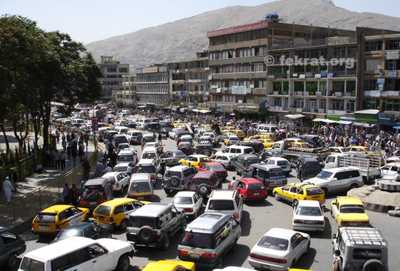By Colin Perkel (CP)

The city of about five million has a handful of traffic lights, but most don't work. Motorists ignore those that do. (Photo: Nasim Fekrat)
Pity the poor Kabul traffic police officer.
Adding to the hazards of the job - dust, chaotic traffic and the occasional beatings from irate drivers - comes new insult to injury: No pay.
The government just doesn't have the money right now, yet another sign of the precarious state of the country.
Shafi Muhammad said he wasn't paid last month, but he's been promised he'll get his money at the end of this month.
In the interim, he relies on a local shopkeeper to supply him with wheat and other vital necessities.
But he couldn't repay his debt last month, he said.
"That's why the shopkeeper was angry."
Driving in Kabul is not for the timid. The bumpy roads, many of which have craters that would swallow a Smart car, have no lane or other markings.
The tiniest piece of open pavement becomes a lane. Right of way belongs to the driver who grabs it.
Nonchalant pedestrians, push carts, cyclists, animal-drawn vehicles and beggars all inch their way around bumpers.
The city of about five million has a handful of traffic lights, but most don't work. Motorists ignore those that do.
Speeding is not much of an issue - reaching 35 or 40 kilometres an hour is barely possible.
When the money does come, Muhammad, 19, earns the equivalent of $150 a month trying to keep Kabul's perpetually gridlocked traffic moving.
"The biggest problem is dust," Muhammad said. "It really disturbs us."
Much of the time, traffic police are simply ignored. Sometimes, motorists take exception to the directions given, get out of their cars and pummel the unarmed officers.
"Some of the people use force," Muhammad said.
"We cannot tell them anything because they have the money, they have the power."
Sent out with little more than his peak cap and grey uniform, he was given no training, learning on the job by watching colleagues.
Asked about the problems, a more senior traffic officer whipped out his cellphone to show the complaint calls he has made to government.
"I have called the Ministry of the Interior about our problems but no one has solved them," he said, speaking on condition his name not be used.
"The biggest problem we are facing is that we should be equipped properly."
The officer, who works in Paktia province, said megaphones used to bark orders at motorists are broken. They have no signals, or fluorescent vests to wear at night on streets that have no lights.
Officers have no way to keep warm, either on the beat or in their offices, he said.
"All of the cops have coughing problems," he said.
He, too, is awaiting his pay - he earns US$200 a month overseeing 34 men - although he's optimistic the money will arrive eventually.
To make ends meet, the 30-year-old works a construction job for six hours a day after his traffic duties end.
It's no surprise some officers resort to shaking down people, he said, although he was adamant he does not tolerate corruption in his ranks.
He's not the kind of boss who demands his men bring him 10 thousand afghanis - US$200 - every Thursday evening, he said.
Instead, the officer said he considers himself a professional playing a vital role keeping traffic moving.
"This is what I'm doing for my government, for my people, for my country," he said.



